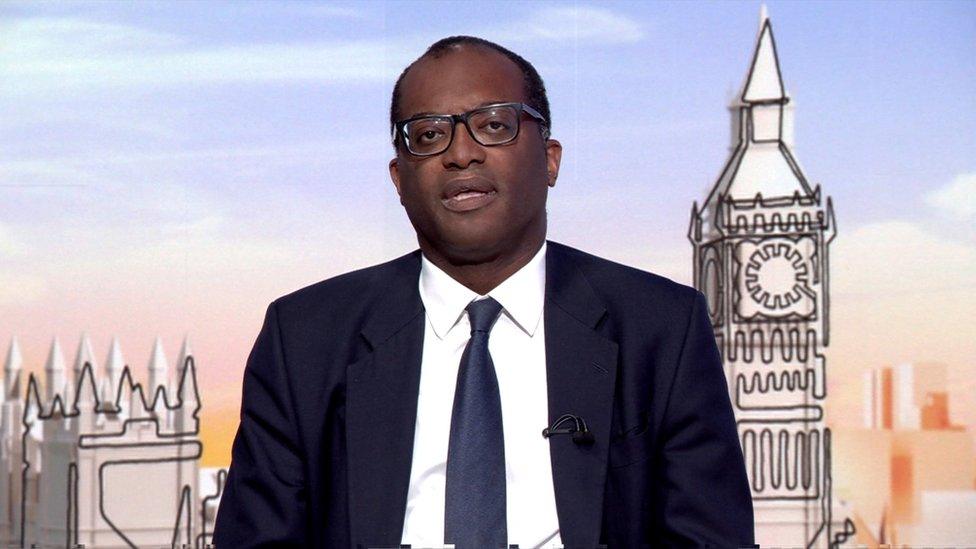How far can income tax rates diverge?
- Published

Chancellor Kwasi Kwarteng set out his mini budget last week
The diverging approach to tax, following Kwasi Kwarteng's mini-budget, raises questions for the Scottish government - about how much it could lose in revenue if that gap widens further.
"Behavioural effects" by high earners seeking to minimise their tax bills can backfire on a finance minister who wants to raise revenue from the highest earners.
If you're earning more than £150,000… first of all, that's very nice for you. But there's going to be quite a big gap between the tax rate you'll pay on your earnings to Westminster, and the rate you might pay if you're classified as a Scottish income tax payer.
Each marginal pound over that level will bring you a bill of 46p from the Scottish government, while Kwasi Kwarteng, the new chancellor, is asking for 40p from next April. So, which would you prefer to pay?
If, let's say, your earnings are £250,000 a year, you'll pay just over £101,000 in Scottish income tax. Unless there are further changes, from next April, that will be £9,046 more than you would pay for the same earnings in England.
For that, you'll get higher public spending per head (which ought to mean a higher quality), free university tuition fees, a more generous level of support for elderly care, free prescription, eye tests, and so on.
So you may reckon that it's money well spent, or that it's a part of the social contract that you ought to support, as life has been financially rather kind to you.
Tax net
Or you may take a different view - that the money you earn is yours, and you should do what it takes to minimise the amount you hand over to His Majesty's Revenue and Customs.
You have a higher incentive to lower your tax bill than lower earners, and you can probably afford a clever accountant.
So what can you do to avoid that higher Scottish tax bill? Well, you could move to England. But if the £9,000 is the tax gap you're facing, that's unlikely to cover your bill for removers. And although prices vary, England's average house price is substantially higher than Scotland's.
Or you could stay where you are and your accountant could transfer your earnings so that they're caught in the Westminster tax net.
If you own a business, you can take your pay in dividends instead of a salary. Dividend tax is paid at the rate set by Kwasi Kwarteng - all of it, not just at the margins.
That means a big loss in revenue to the Scottish government.
Fat cats
We're talking here about someone who is exceptionally well off, in the top 0.6% of Scottish taxpayers, and who is currently living in Scotland.
What about someone thinking of moving to Scotland? Let's say, someone who is earning a bit less, and doing a job that we highly value. A doctor, for instance. The whole of the UK needs more of them, so they can choose where they locate.
If that consultant is on £100,000 annual earnings, they will pay £2,420 more income tax next year by taking a job in Scotland rather than south of the border.

A consultant earning £100,000 a year will pay £2,420 more income tax next year by taking a job in Scotland rather than England
Not such a bad deal when you consider the advantages. But that's just year one: you'll have to make a judgement on whether that gap is going to widen. And then, there's the tax on buying a house.
Let's suppose this doctor wants to get a home that fits the status, costing £750,000 (in Edinburgh, Glasgow and some nearby suburbs, that doesn't buy as much as you might think). The transactions tax or stamp duty for that in England has just been cut to £25,000, while in Scotland, it's £48,350.
If that doctor already owns a house and doesn't want to sell it, for whatever reason, the tax on buying that additional home in Scotland will be £78,350.
This is not to get any sympathy for high earners facing big tax bills. It's to set out the issues as they see them. And as they include doctors, they can't all be caricatured as fat cats.
Working from home
We're talking here about "behavioural effects" of diverging tax regimes. Where people can move freely, as they can in a nation state such as the UK or USA, different tax rates provide an incentive to move. And the more you earn, the higher incentive.
We don't know how big the effect will be in the UK, because we're new to this. In the US, you can see over a long period the effect of low tax New Hampshire increasing its population on the border with higher tax Massachusetts, within commuting distance of Boston.
For decades there has been a move from the northern, higher-tax rust belt to the southern, lower-tax sunbelt. Some of that is for the quality of life, but not all.
That long-term effect has been speeded up by Covid, the shift to working from home, and increasingly working a long way from your office.
There is now tax competition similar to the appeals to corporates, wishing to bring these "digital natives" to pay low tax rates in attractive places to live.
CNBC reports that of the five US states with the biggest out-migration, four are seen as "high tax", external. And if the response to losing the high-earning tax base is to increase taxes more to protect public services, it cites concerns that the trend will only accelerate.
Priorities diverge
So how will these "behavioural effects" play out with divergent tax regimes in Scotland and the rest of the UK?
The Scottish Fiscal Commission had a go at estimating the effect when the Scottish government chose to put an extra penny on three of its five tax bands.
For those earning more than £150,000, the 45% rate went up to 46% in Scotland, and the "higher rate", now kicking in just above £43,000, went up to 41% instead of the nearest equivalent Treasury rate of 40%.
The higher rate was reckoned to bring in £115m more by this year, if nothing else changed. But things do change, and assuming five years of behavioural effects, the Fiscal Commission reckoned there would be a loss of £27m in the higher rate bracket, so a net gain of £88m.

The mystery man, from the Wakefield area, asked for his name and address to be kept secret
The additional rate earners showed behavioural effects to be strongest. The fiscal commission, which produces the figures the Scottish government must work with, reckoned on an increase in revenue, if nothing else changed, of £35m by this year.
But if behaviour does change in ways that these public finance experts assume it would, they would reduce income by £32m, leaving only £3m net gain.
That was for a gap of one penny in the pound on earnings above £150,000. Assuming the Scottish government does not choose to match Kwasi Kwarteng's abolition of that additional rate of tax (meaning his marginal rate falls from 45p to 40p - the higher rate), you could reasonably guess that the behavioural effect will mean the 46p rate is negative.
It doesn't take many such people to make a big difference. There are somewhere around 20,000 people who are above the £150,000 threshold for additional rate tax. The figures for 2019-20 show they paid one pound in every six of Scottish income tax revenue. The UK is unusually dependent on such high earners for its income tax revenue - the Treasury moreso than Holyrood.
So while the Scottish government can be clear that any future tax cuts are unlikely to favour the highest earners, because its priorities diverge from those of the new occupants of Downing Street, it can't ignore the risk to revenue if it creates incentives for those high earners to take themselves or their earnings out of Scotland.
Related topics
- Published26 September 2022

- Published25 September 2022

- Published23 September 2022

